Watch our 2024 panel session on how UK startups can go global, in which our industry leaders discuss the best cities for startups around the world. This session is chaired by Janet Coyle CBE (Managing Director, London & Partners) and includes speakers Yoram Wijngaarde (Founder & CEO - Dealroom.co), Minette Navarrete (Founder and Manager - Kickstart Ventures), Dr Bing Xiang (Founding Dean and Dean's Distinguished Chair Professor of China Business and Globalization - Cheung Kong Graduate School of Business), and Mohammed Al-Emadi (Senior Manager of Investment - Qatar Development Bank).
Panel Discussion: Does Place Matter When Founding a Startup? How To Go Global
This video article forms part of our 2024 London Tech Week highlights series. This article has been created using a transcript of the above video.
Featured Speakers
Yoram Wijngaarde (Founder & CEO - Dealroom.co)
Minette Navarrete (Founder and Manager - Kickstart Ventures)
Dr Bing Xiang (Founding Dean and Dean's Distinguished Chair Professor of China Business and Globalization - Cheung Kong Graduate School of Business)
Mohammed Al-Emadi (Senior Manager of Investment - Qatar Development Bank).
Host
Janet Coyle CBE (Managing Director, London & Partners)
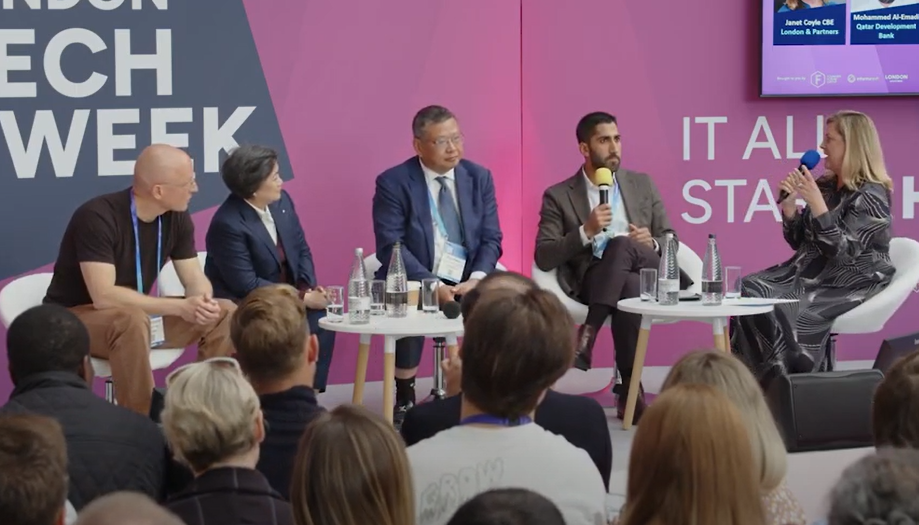
Where are Best Startup Locations Around the World?
Don't miss out on the opportunity to elevate your startup this year. Secure your Startup Pass for London Tech Week 2025 today and join the conversation!
Janet: [00:00:00] Now, it's my enormous pleasure to introduce our first panel of day two here on the Founders Stage at London Tech Week. Chaired by the powerhouse that is Janet Coyle, Managing Director of London Partners, we have a cast of experts for you on the subject of how to decide where to base a startup, given it's London Tech Week. I hope at least some of them are going to say London and how to take those first steps towards building an international business. Janet will be joined by Yoram Weingarder, founder and CEO of Dealroom, a global data platform for intelligence about startups. I'm sure lots of you are familiar with it.
And they will also be joined by Dr. Zhang Bing, who is the founding dean and professor of China Business and Globalization at the CKGSB. Mohamed Al Emadi, Senior Manager of Investment at Qatar Development Bank, and Minette Navaretti, Founder and President of Kickstart Ventures. Let's give a huge London Tech Week welcome to Janet and her panel.
Overview of the Discussion
Janet: Thank you, Hannah. Oh, this is so exciting. Here you go. Hello, everybody. So Hannah did a brilliant introduction to my panel. I feel as if we're going to go around the world in 40 minutes, 45 minutes. I'm very excited about this conversation. Can I just have a show of hands? Brilliant audiences. Can you put your hand up if you're a startup or scale-up or business here in the UK? Fabulous. About half of you. Can you put your hand up if you're a startup entrepreneur or scale-up from somewhere else around the world? Brilliant. So probably about a third. Hands up if you're policymakers, sponsors, or just generally interested in this conversation. Just probably about another third. Brilliant.
Okay. My name's Janet Coyle, and as Hannah said, I'm managing director of what we call Grow London and Partners. We help scale-ups all around the world come and choose London and help them scale here. We assist lots of London companies to scale and win international business. Anyone from the Grow London team here? Woo, we've got a hand up there. Fantastic, we've got Rachel in our marketing team. There are plenty of people here to help you understand how we can help you enter all these international markets. But this conversation isn't really going to be about London, I promise you.
Global Perspectives: Insights from the Experts
Because we've got representation here from Dubai, from China, from the Philippines. I'm so excited to have the founder and CEO of Dealroom. We use Dealroom data a lot. How many people use Dealroom data? Oh, gosh, we've got some work to do here. So as Hannah said, we have Yoram Weingarder, who's the founder and CEO of Dealroom. We've got Minette Navarrete, who's with Kickstarter, but also with a company called Globe Telecom in the Philippines. They’re going to help us understand Southeast Asia a lot more. We've got Dr. Zhang Bing, who's founded the first-ever independent business school in China. Really impressive. The number of unicorns coming out of his business school is incredible. And of course, we have Mohammed Al Emadi, who’s with us here from Qatar.
Take the first step toward global expansion! Register for a Startup Pass for London Tech Week 2025 and discover the trends that will define the future of business.
That's a really impressive panel to start. Now I'm going to kick off with Yoram. Let's just set the scene, Yoram. Can you share with us what you're seeing in terms of the data? We're talking about place—not necessarily where the best place is, just because we can get into talking about that for days—but what are you seeing in terms of the trends of which places businesses want to start to scale to become unicorns or decacorns? What is the data showing us?
Yoram: Yeah, no, absolutely. When it comes to startup data and venture capital data, it's really important to not get too caught up in the current cycle because venture capital is a very cyclical business. If you take a step back and look at a ten-year horizon, Silicon Valley was built over a period of 40 years. If you compare data almost anywhere in the world today versus ten years ago, you see a massive increase in activity, and startup ecosystems are blooming everywhere.
You also see that startups, including unicorns, can come from literally anywhere, and that trend will increase now, thanks to AI. Teams will be able to do much more with smaller teams. So it's only going to be more global; however, that doesn't mean that the big hubs are becoming less important. They are also massively growing.
Understanding Dealroom and Its Impact
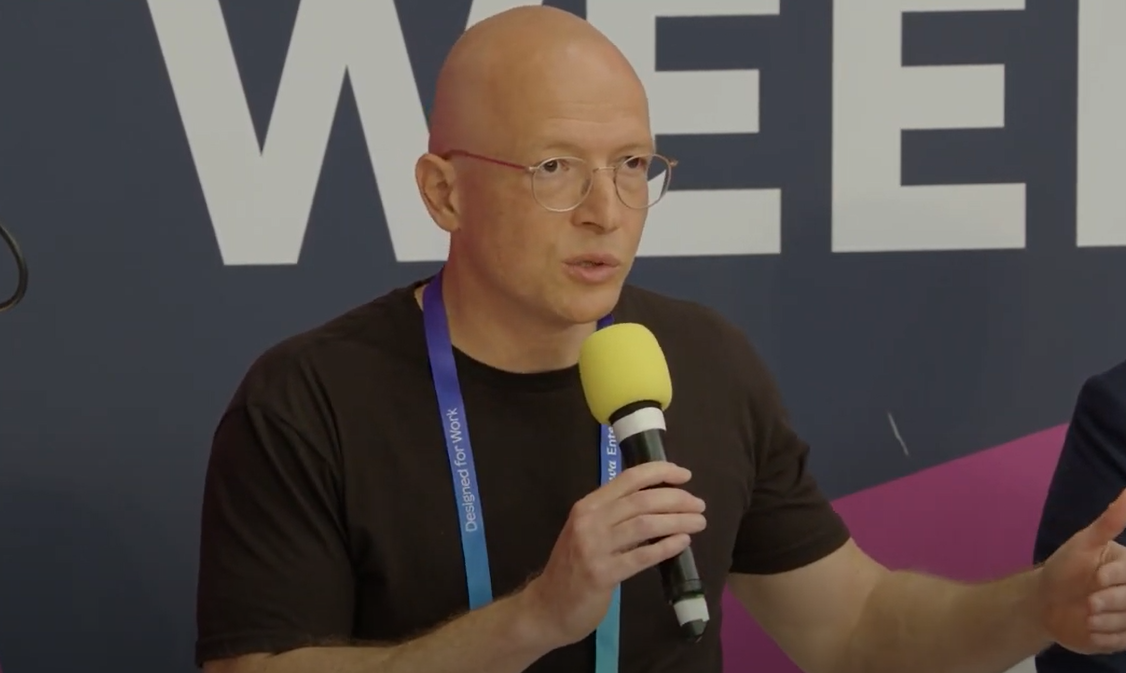
Janet: Do you want to say a little bit about—just because there weren't very many hands that went up—do you want to tell us a little bit about Dealroom and what you do?
Yoram: Yeah, so we are a global platform where you can find information about any startup in the world, especially the ones that are venture-backed. There is also a free version, so I would definitely encourage you to check it out. Our data is used by the most well-known VCs that you know, from Sequoia to Index Ventures, Boulderton, you name it. We're also the official data partner for over a hundred governments worldwide, from Berlin to Las Vegas, to Miami, to Tokyo, and to Taiwan. There’s just a lot of data that you can find there, and we help London Partners understand trends but also with discovering startups for you to partner with.
Janet: Thank you! Are you seeing any kind of geographic trends? Are a lot of our scale-ups showing interest in the Middle East, in Southeast Asia, and in China? Some of that is actually being drawn by the investment opportunities. We know there’s a lot of funding in the Middle East, a lot of funding in North America. Are you seeing that as a magnet for startups to move into different markets?
Yoram: Sorry, can you just repeat?
Janet: Is venture capital a magnet you’re seeing for businesses to move into other international markets?
Yoram: So do you mean if venture capital accelerates companies going global? Yeah, absolutely. That's the case. We shouldn’t be too nervous about companies actually moving out. Sometimes a startup becomes really successful and just wants to move to a bigger market. That’s a great thing that we should support. Also, exits are generally a good thing because we’re still an early ecosystem. The more people can have success and learn—and also interact with bigger ecosystems—that's only a good thing, actually.
China's Global Outlook: Insights from Dr. Zhang Bing
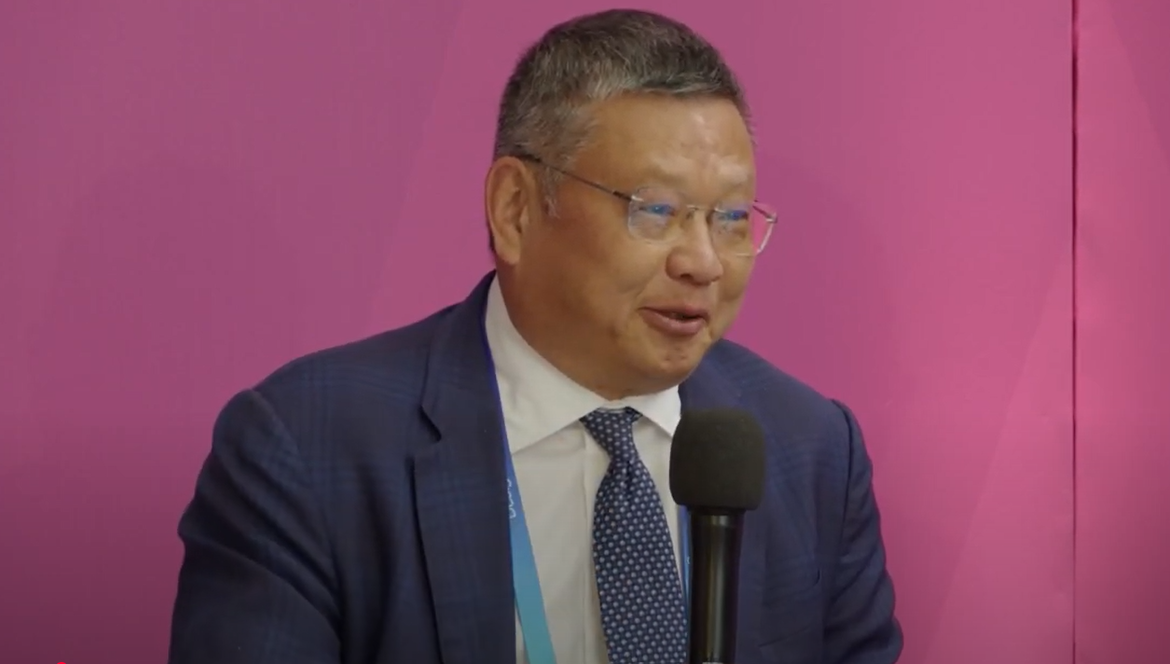
Janet: Brilliant! And Dr. Zhang Bing, let's come to China—a huge market. I’d love to hear what you’re seeing in terms of the unicorns being produced in China. Right now, what is the sort of global outlook? Are there Chinese companies wanting to expand internationally, or do they tend to stay due to such a huge market?
Bing: Thank you for having me here. I'm a professor, so I dress differently from each of you. One of the concepts I've been advancing for the past two decades is what I call economic disruption. China may be the most disruptive economy globally for the past two decades, maybe four decades. This is measured in terms of newly emerged global Fortune 500 companies. China had 11 to begin with 20 years ago; now China is head-to-head with the United States in terms of newly minted billionaires. Unicorns—China's number two.
About 40 years ago, China started reform. Our GDP per capita was 25 percent lower than India's. Right now, China's GDP is five times bigger than India’s. One of the reasons we keep generating new kids on the block is due to this side. More recently, you see some Chinese companies doing extremely well in the United States. We know Chinese companies are excelling in the alternative energy sector with solar and hydro. China contributed more than 80 percent of the global capacity—no overcapacity in that regard. We need alternative energy for climate change.
Also, you see the success of TikTok. Most of the founders of TikTok are EMBA program graduates from my school. You see the success of PDD, whose founder is in our unicorn program, Huang Zheng, Mr. Huang. There are companies competing head-to-head in the United States and winning. Out of the five most popularly downloaded free apps in the United States, three are from China: PDD is number 1, TikTok number 2. So finally, there are companies from other countries that can play a major footbal game and win. The U.S. should respect that, not blame them for subsidies. There’s no subsidy whatsoever, TikTok, PDD, or Xing.
Chinese Investments and Market Entry for International Companies
Janet: We’ve also seen some fabulous Chinese investments here in London recently. We’ve had BYD—we see the electric buses that are going around; that's a Chinese company from Shenzhen—and Ping Pong, a fintech company that recently invested here. Also, a subsidiary of Tencent has recently set up here. So we're seeing a lot of great innovation coming out of China.
Register for a Startup Pass for London Tech Week 2025 and discover the trends that will define the future of business.
What about companies here or international companies wanting to come into China? How easy is it?
Bing: China has been the second-largest recipient of FDI for decades. The U.S. was number one; only two years ago, China overtook the United States as the largest recipient of FDI. Firstly, I think do not underestimate the power of imitation. In China, wise people imitate. Those who try to innovate—most of them failed. Most of them failed. Right now you can make a significant amount of money by imitating some of the business models from China to India, Indonesia, the Philippines, and many other countries. Make 10 billion U.S. dollars first. If you spend a billion dollars on innovation and fail, you still have 9 billion U.S. dollars in your pocket. Learn how to walk before you learn how to run. Don’t feel bad about imitation; it could be a sound strategy.
I'm very positive there are opportunities for Chinese to replicate some of the innovations in China to Europe. At the same time, China has much to learn from Europe—in terms of brand building, deep tech, and all that. Also, for Europe, the EU is your second-largest consumer market, over 15 trillion U.S. dollars, which is much bigger than China’s GDP of 9.3 trillion. The EU is the largest trading block on Earth, three times more significant than China. Intra-nation cross-border e-commerce: Europeans have a tremendous advantage in this space. The issue is deregulation. Too much regulation here—my God! It takes months to open a bank account and a month to get a phone card. My God, unbelievable!
Entrepreneurial Growth in Southeast Asia
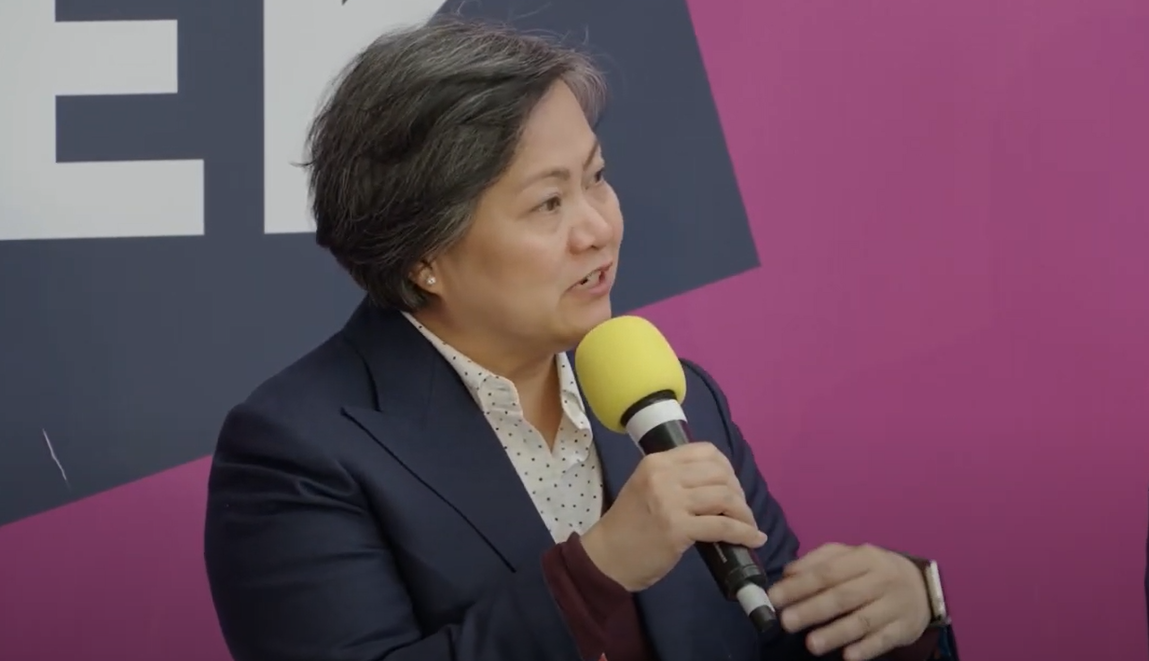
Janet: Great selling points for Europe. I love it. This is why it’s so important that we keep collaborating with Paris, Berlin, Amsterdam, and other parts of Europe. Minette, what are you seeing in the Philippines in terms of the growth of entrepreneurship? Are you noticing startups wanting to go global, or do they prefer staying within Southeast Asia?
Minette: Southeast Asia is a very different region. It’s a bit slower and behind compared to the U.S. and China. However, it has one strong asset: many countries are still in a demographic sweet spot. The productive age, the ages of 15 to 45, represents the chunk of the population that opens bank accounts, buys from shops, starts businesses, purchases homes, and takes out loans. If I look at a country like Indonesia, they’ll be within that demographic sweet spot until well beyond the 2030s. In the Philippines, we’ll be growing that demographic segment all the way to 2055.
Find out more about our London Tech Week pass types and prices.
So a lot of the companies and startups that set up are going to be looking at the customer base. Will they be able to establish themselves in countries like the Philippines, Malaysia, or Indonesia, where the population spending is also going to begin to grow? Many of the startups, whether genuinely independent or expanding into Southeast Asia, are focusing heavily on the customer base.
Investment Trends and Opportunities in Qatar
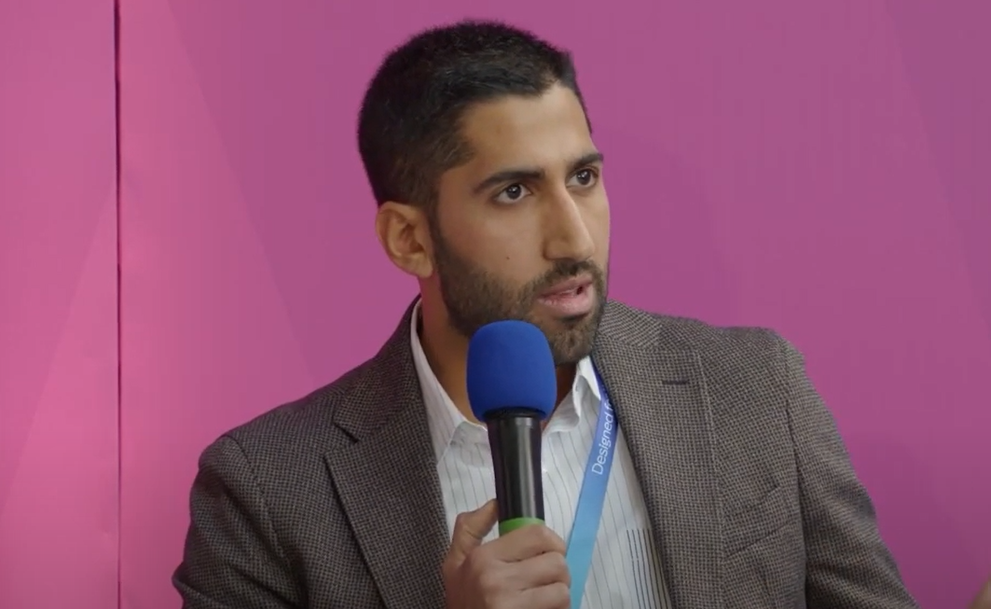
Janet: And what about a UK startup wanting to access that market? There’s been talk of trade agreements and collaboration. Are you seeing a real shift?
Minette: We are seeing several companies from the UK interested in securing Asian investors. For example, we have made an investment in Edinburgh, and they aren't aiming to expand into the Philippines or Southeast Asia just yet. Their primary target market at the moment is the United States. This company, Rosslyn Technologies, does stem cell banking with IPSCs. Their interest is to have an Asian investor on their cap tables because they will eventually want to expand into Asia.
Janet: I’m going to come back to investment. Actually, let me bring Mohammed in because I'm curious about the trends we’re seeing in different parts of the world. In the Middle East, particularly Qatar, we’re hearing quite a lot about UK startups wanting to access opportunities there. What trends do you see, Mohammed, and how are you encouraging interest from the UK?
Mohammed: First of all, thank you for inviting me to London Tech Week to speak here today. I think I should be in the middle—between the UK and Southeast Asia—so we maybe need to relocate. Look, if you look at Qatar as a nation, it’s been a very interesting few years for us.
When I set the context, I would split the era of our national vision into a couple of phases. The first phase involved building the required infrastructure for the nation, both physical and digital, which ran from 2008 to 2020. This made us ready for the World Cup 2022, with all projects catalyzed by the event. Recently, Qatar has launched the final phase—what we call the last sprint—toward achieving our 2030 vision. If you examine the Qatar National Development Strategy 2024-2030, you’ll see significant emphasis on technology, entrepreneurship, research and development, and digital economy development. This puts a lot of opportunities in place.
Regarding Qatar and the UK, I would say there is a very strategic relationship at the leadership level. In terms of trade, Qatar and the UK are very active with trade exchanges; the UK is one of Qatar's top countries for trade. Qatar's investment in the UK has exceeded 40 billion pounds across various sectors. In 2022, a strategic investment partnership was signed by Qatar and the UK, committing a total of 10 billion British pounds in investments. There are many opportunities between both countries; we're seeing numerous startups from the UK approaching us to tap into those opportunities.
Ready to take your startup to new heights? Register for a Startup Pass to London Tech Week 2025 and unlock a future of possibilities
Specific Sectors for Collaboration and Investment
We’ve recently launched the Startup Qatar Investment Program alongside the Web Summit Qatar will be hosting over the next five years. We hosted the first version in February and will continue for the next five years. If you look at the population and the companies that applied to tap into that fund to access the regional market through Qatar, the UK was among the top five in terms of applicants.
So there are plenty of opportunities, and I'm happy to cover them in the next questions, I think.
Janet: Thank you! Are there any specific sectors you’re particularly aiming to build in Qatar that UK capability might access? I know sustainability is probably one. What other sectors should we know about?
Mohammed: The easy answer is the sectors identified in the Qatar National Strategy 2024-2030. So we have nine clusters within that strategy across different sectors. Financial services is one sector we wish to develop. Within future clusters, we want to focus on green technology, climate technology, and building a robust energy infrastructure. We want to advance technologies in AI, as we have a dedicated AI committee that looks after development across all sectors. We recently launched Project FNAR, which aims to develop one of the largest large language models and generative AI for Arabic to create a comprehensive directory on the Arabic language.
So I would say logistics is another key sector for us. We have developed numerous economic and free zones and are building digital infrastructure across them.
Audience Engagement: Insights and Questions
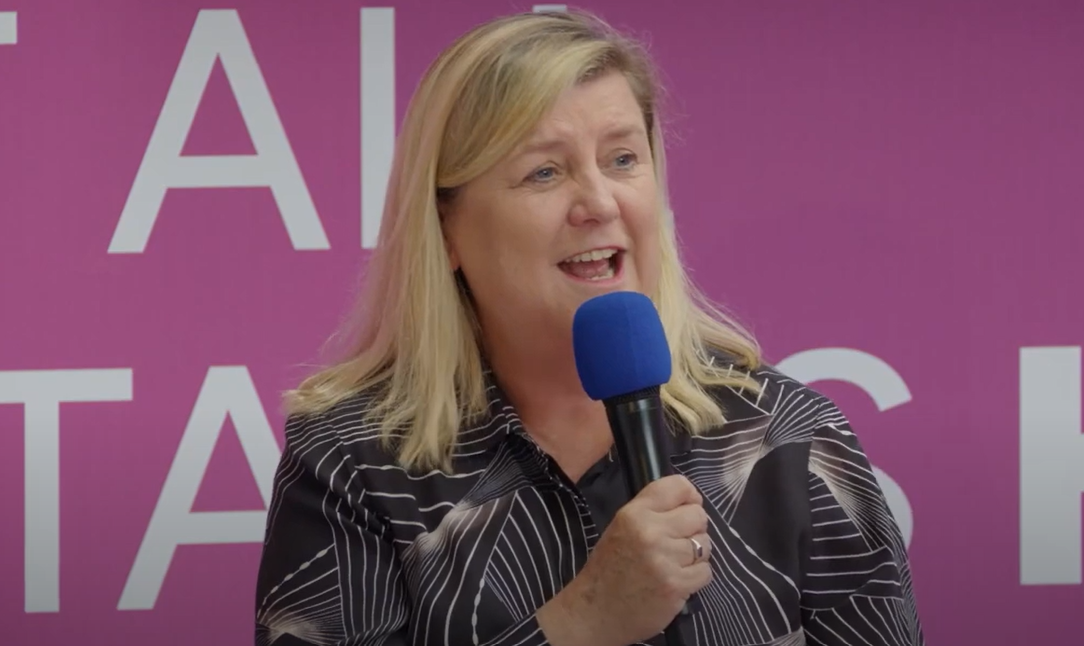
Janet: Great! So, any companies in clean tech, sustainability, logistics, or enterprise tech? Mohammed’s the person to talk to! I have lots more questions, but are there any from the audience at this stage? There’s one at the back—sorry Jack, can you get around to the microphone? I want to ensure you make the most of this panel. We have a question there. Two questions next to each other, which helps. Do you want to say who you are, which business you’re with, and who you want the question to go to? Thanks.
Lara: My name is Lara Asi. I'm the MENA Region Lead for Athenai Fund X. I want to ask you—Mohammed, of course—about brain drain we’ve seen from the East to the West over the past few decades. Do you think we’re seeing a reverse brain drain right now to the Gulf regions? And how is Qatar addressing that in terms of nationalism and upskilling nationals before opening doors to startups? Thank you.
Mohammed: Absolutely. Thank you for the question. That’s interesting. When we look at the ecosystem globally, I see opportunities in the Middle East, especially with thriving capital and growth. There has been a decade during which we've seen many talents and capabilities leaving the region for opportunities abroad.
However, I believe the time is right to invite that talent back as well as to bring in new talent. Qatar has built a strong educational infrastructure with world-class universities—universal across most of the GCC. Today, there is no excuse to claim one must go elsewhere to acquire certain skills.
We are also actively developing capability programs. I’ve discussed the Startup Qatar Investment Program, which aims to attract talents globally—whether they are from the Middle East looking to return or from other countries that wish to come because we’re providing opportunities and investments to localize talent and upskill nationals.
Janet: That’s a brilliant question and answer! From what Mohammed is saying, we have global talent. We want collaboration with universities and R&D. We’re in a very different place now. Dr. Bing, would you like to chime in on talent?
Bing: A short remark on this. With the de-linking between China and the U.S. and the bifurcated market economy, the GCC has a unique opportunity to be truly global—becoming a bridge between two sides of the world.
Janet: Great! Minette, would you like to address this as well?
Minette: This is a terrific question. I agree with what was said; access to capital, talent, infrastructure, advisors, and customers matters. Talent can be found anywhere. We’ve seen companies in Singapore with engineering teams from Ukraine, India, and different parts of the world, depending on where expertise is located.
Join the startup revolution at London Tech Week 2025! Sign up for your Startup Pass now and connect with industry leaders and fellow entrepreneurs.
Concerning brain drain, although there may be worries, the exposure that expatriates bring can broaden mindsets. Repatriates—those who have gone abroad and return—often do so with a different, more global perspective, which we welcome.
Importance of Female Participation in Entrepreneurship
Janet: Thank you, Minette. Angie, I believe you have a question?
Angie: Hi, my question is for either Dr. Bing or Mohammed. How important is it for women to participate in entrepreneurship and tech entrepreneurship? What are you guys doing to encourage more women to participate?
Janet: Great question! Yoram, since you are analyzing trends, are we seeing a shift in data regarding women entrepreneurs?
Yoram: I was looking at my colleague Orla, who is our head of research, and she was shaking her head. It’s not changing.
Janet: It’s not changing, is it?
Yoram: No.
Janet: So I think we should ask all three panelists—the question may not be fair, but it’s important. Mohamed, what are you doing to actively encourage women in entrepreneurship?
Mohammed: I believe entrepreneurship is an open space for everyone. Placing statements that certain categories need empowerment creates boundaries. In my view, entrepreneurship is a space available for both genders. We have very active participation; over 80 percent of my team managing venture capital funds are women. Their success stems not from needing empowerment but from their capabilities.
Janet: That’s good to hear, Mohammed! We will revisit this in three years to examine the data. But it’s great you have 80 percent women in your team. Dr. Bing?
Don't miss out on the opportunity to elevate your startup! Secure your Startup Pass for London Tech Week 2025 today and join the conversation!
Bing: Our EMBA program enrolls 800 students annually, with less than 20 percent being women. It’s not ideal. However, in our MBA program, over 50 percent are women, which is promising. We emphasize women in leadership. Mao Zedong, the founder of the People's Republic of China, said, “Women hold up half of the sky.”
Countries like China, Korea, Japan, Singapore, and Vietnam are predominantly Confucian societies, where women’s statuses are relatively low. Mainland China is doing better in that regard. For our school, we developed a women's leadership program. The co-founder of TikTok is an EMBA student at our school, and we work with UNESCO on a five-year project to promote not only unicorns in Africa but also women’s leadership there as well.
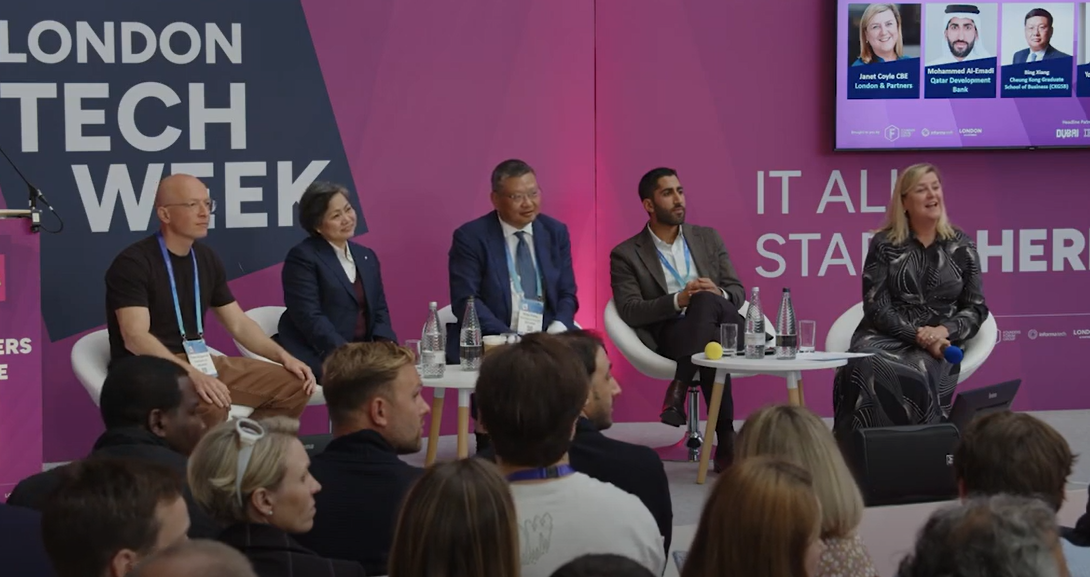
The Landscape for Women Entrepreneurs in Southeast Asia
Janet: Thank you, Dr. Bing. Minette, what are you observing in Southeast Asia?
Minette: We see less than 2 percent of venture funding goes to women-led businesses in the UK or Europe. That statistic isn’t changing much. There are efforts to address this and try to get more women investors. In Southeast Asia, it's similar; however, the Philippines is unique. More than half of the check writers among investors are female. In my senior investment team, half are women.
However, among founders, we receive 75 percent of the pitches from all-male teams. That said, when we make investments, closer to 30 percent are female. So we see a disproportionate success rate for pitches coming from mixed teams.
Janet: That’s encouraging! I see you nodding, so that seems to be the right answer from all of you. Are there any other questions before I continue? There’s one back here.
Audience Member: Good morning! Thank you very much for the great talk. I’m coming from China and have lived in Europe and the U.S. for 15 years, coming from academia and corporate experience as well. My question relates specifically to the topic of place.
For example, if I have a brilliant TikTok idea, I feel China is truly open-minded, innovative, and at the forefront, while Europe and the U.S. feel different. If I want to run my startup in a revolutionary way, should I return to China, which seems more innovative, or should I stay here and attempt to cultivate this mindset?
Janet: Great question! I’ll ask each panel member, but from my perspective, I would say stay in Europe, build it here—there’s a phenomenal ecosystem. Consider who you want to sell your product to and where the customers are. Use this opportunity at London Tech Week; we have 145 countries represented here. You can talk to people who can help facilitate your journey!
Are there any other responses from the panel?
Yoram: I could add that for AI, I would definitely suggest Paris, London, or San Francisco as the hubs where there's ample talent. Some people prefer to hire in San Francisco because it feels close to DeepAI and the forefront of what’s happening. But there’s also loads of talent in the UK, particularly in London, which is dense with tech ecosystems.
Janet: Absolutely! And I think the UK raised more investment in AI than Paris, Berlin, and others combined last year, right? I believe you’re in the right place! We’re happy to connect you, and I think we might be short on time. So I’ll take one final question.
Audience Member: Hi, I deal with startups and scale businesses. When do you invest, and where do we get the funding?
Janet: Great question! Minette, I know you invest, so what stage of business do you typically invest in?
Minette: Because we manage three funds, we span a broad investment range. We have pre-series A investments as well as those in series C.
Janet: And Mohamed, are you actually investing?
Mohammed: Yes, we tend to focus on series A, although in rare cases, we look at series B.
Janet: Brilliant! Dr. Bing, I think you can offer investments from right at the early stage right through to unicorns and decacorns, yes?
Bing: We're the first business school to have a program specifically targeting new money unicorns. We started back in 2015, targeting founder or co-founder companies that have A-series funding, as due diligence by PE/VC is far more reliable than interviews by business schools.
Final Thoughts: Navigating and Learning from Different Ecosystems
Janet: If you think about your respective markets—Qatar, China, the Philippines—you may have a thought about which ecosystem outside of yours you admire. This isn’t a loaded question—you don’t need to say London, but that would be nice! Which ecosystem stands out to you, praised among the rest?
Mohammed: There’s no single answer; every region has its own features and benefits. Each region thrives—whether the states, Southeast Asia, or the Middle East—has its unique capabilities. We have invested and co-invested with several funds globally, mostly from the UK and Europe.
Yoram: I would also echo what I said earlier: the Middle East as well as China both think in terms of the long haul. They think long-term. The Middle East is remarkable for its daring investment style for doing something great.
Minette: I agree! The courage and daring are important. In the UK, however, the investors exhibit due diligence, compliance, and robust abilities to share information across networks. Ultimately, I believe the UK investors are especially talented in this realm.
Bing: Definitely, the ecosystem of San Francisco is admirable in its technological innovations. Yet when it comes to luxury thinking, I look to Europe. European countries, particularly France and Italy, offer lessons on cultivating luxury—the ability to sell higher-priced goods while paying employees quality salaries. In truth, no country is the best at everything. We all have much to learn from each other, and the global ecosystem will become increasingly vital moving forward.
Janet: Thank you all! Seeing the perspectives of each expert, London is indeed dynamic, diverse, and daring. If there is one takeaway, it would be that the global economy is now accessible to startups and scale-ups everywhere. Thank you for your attention. Please give a big round of applause to our brilliant panel!
Want to experience and be part of panels like this one? Register for your startup pass today to save - or explore other pass options.
